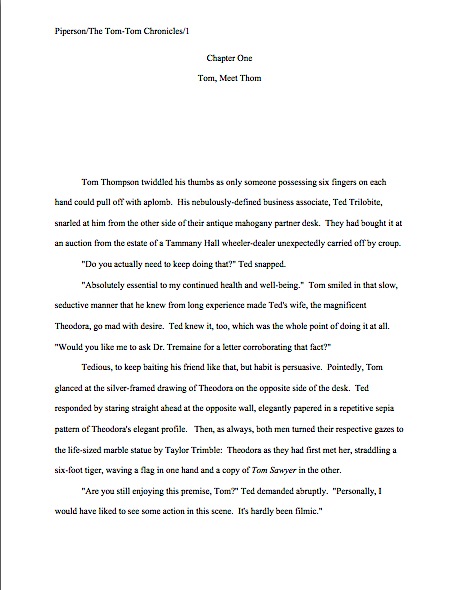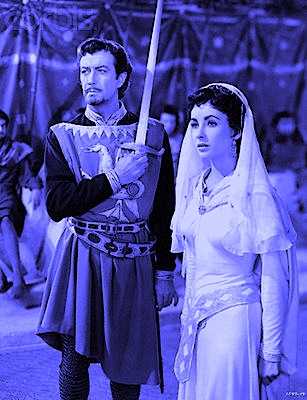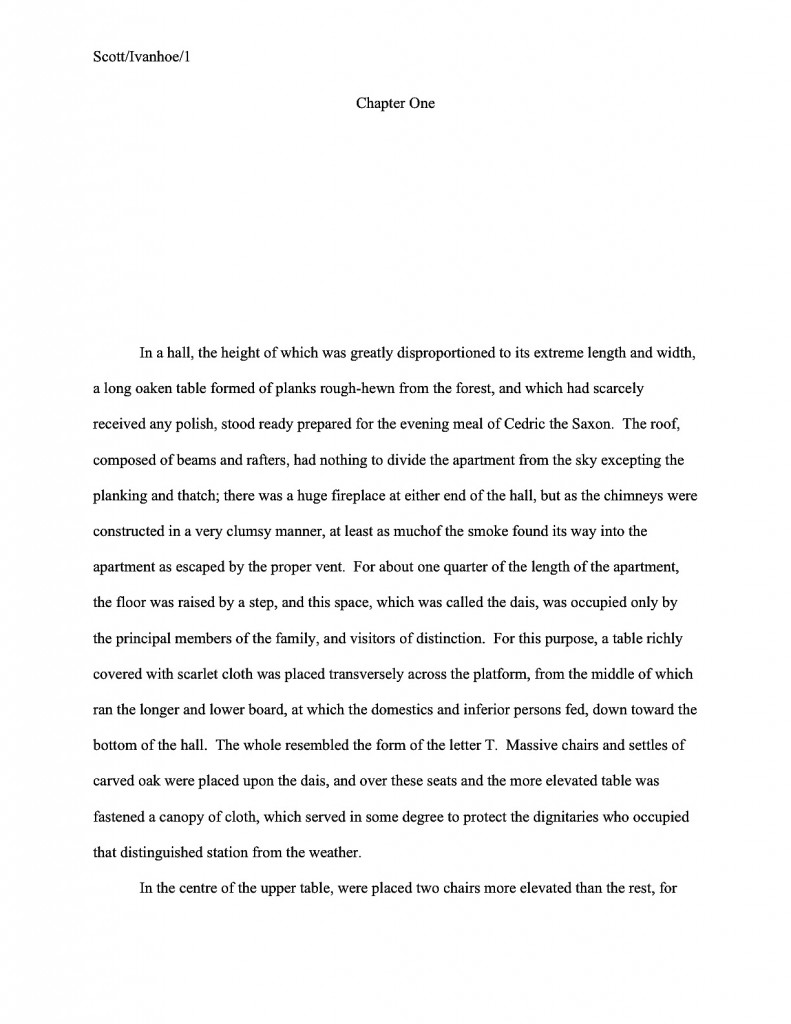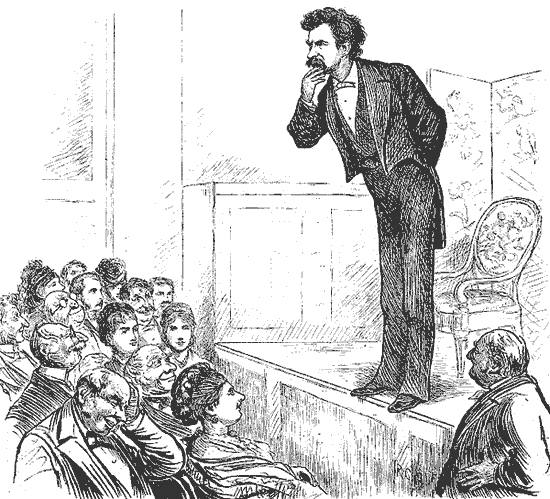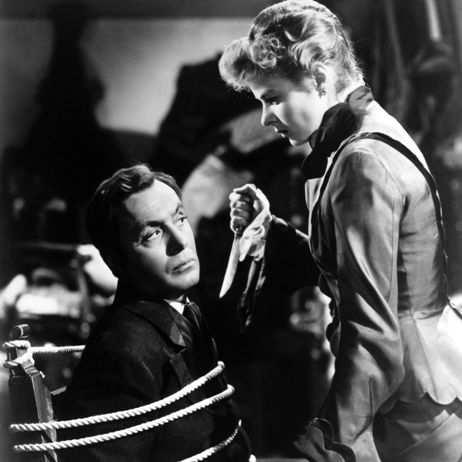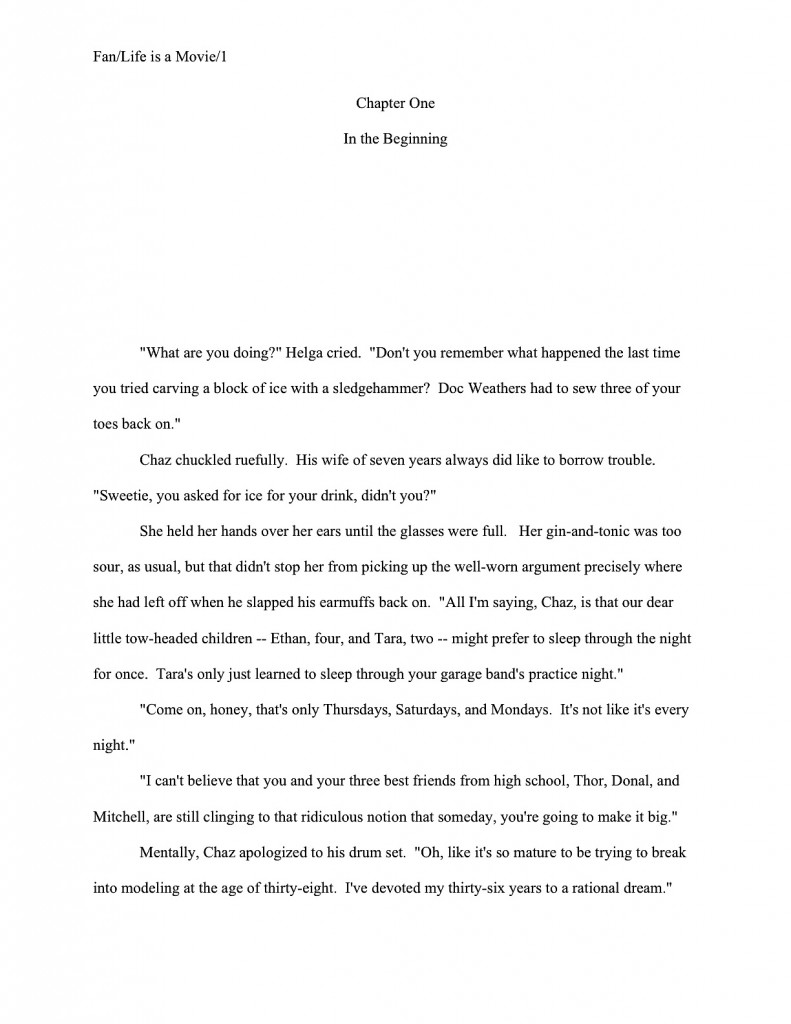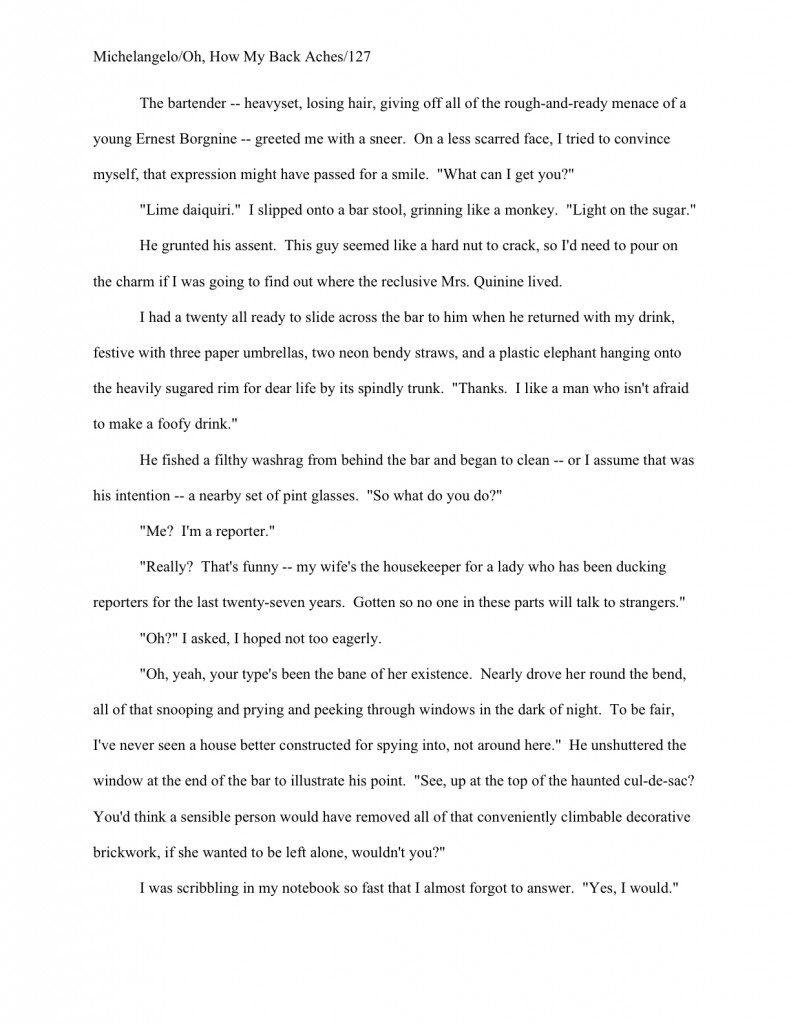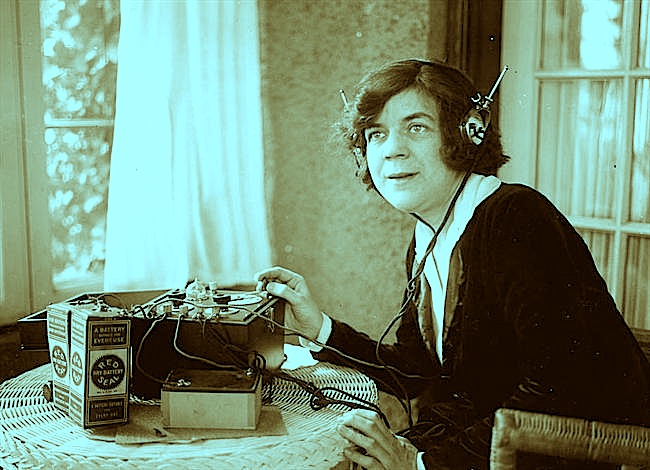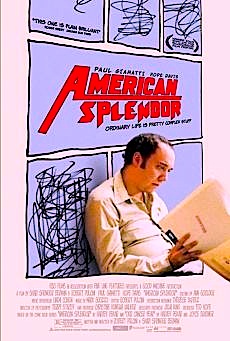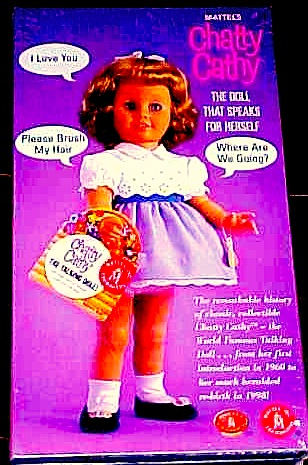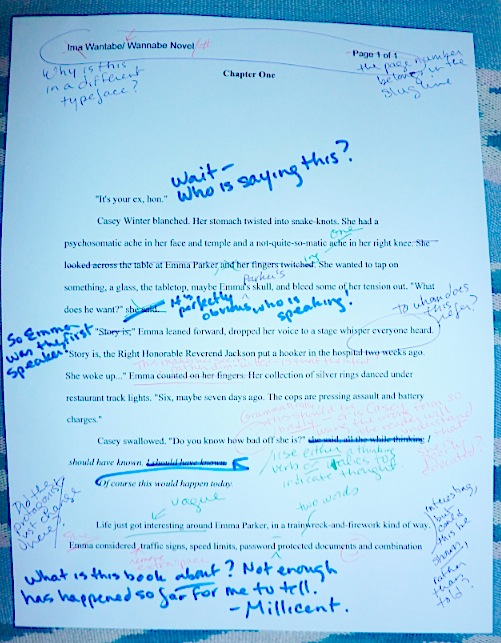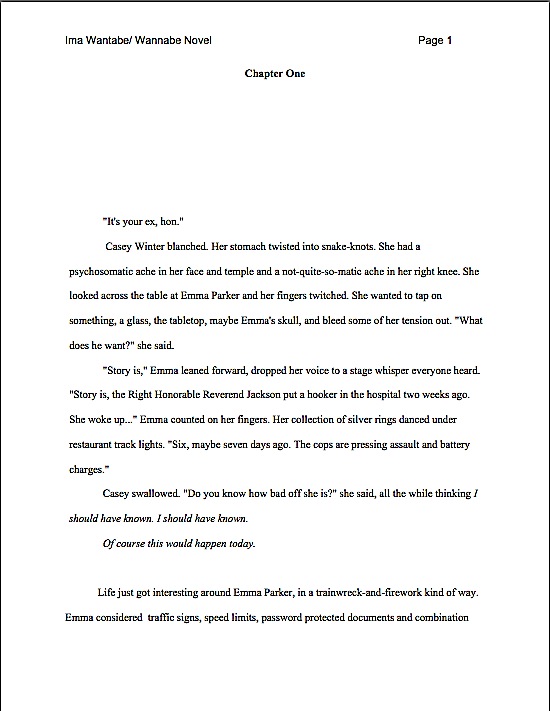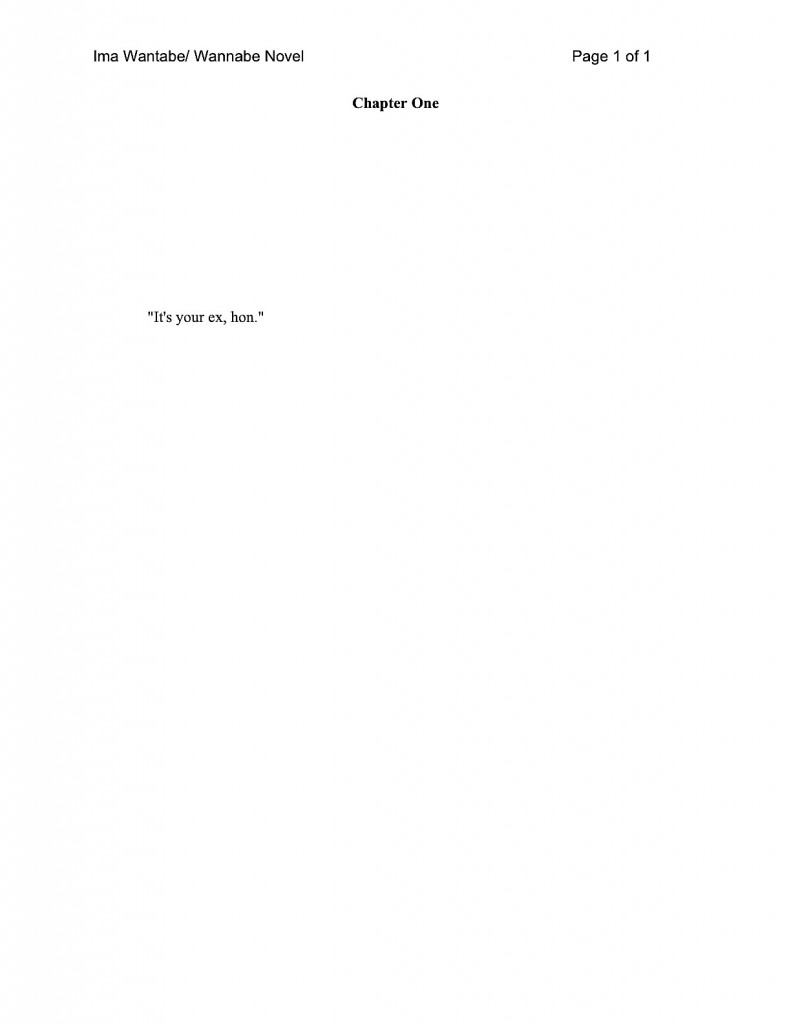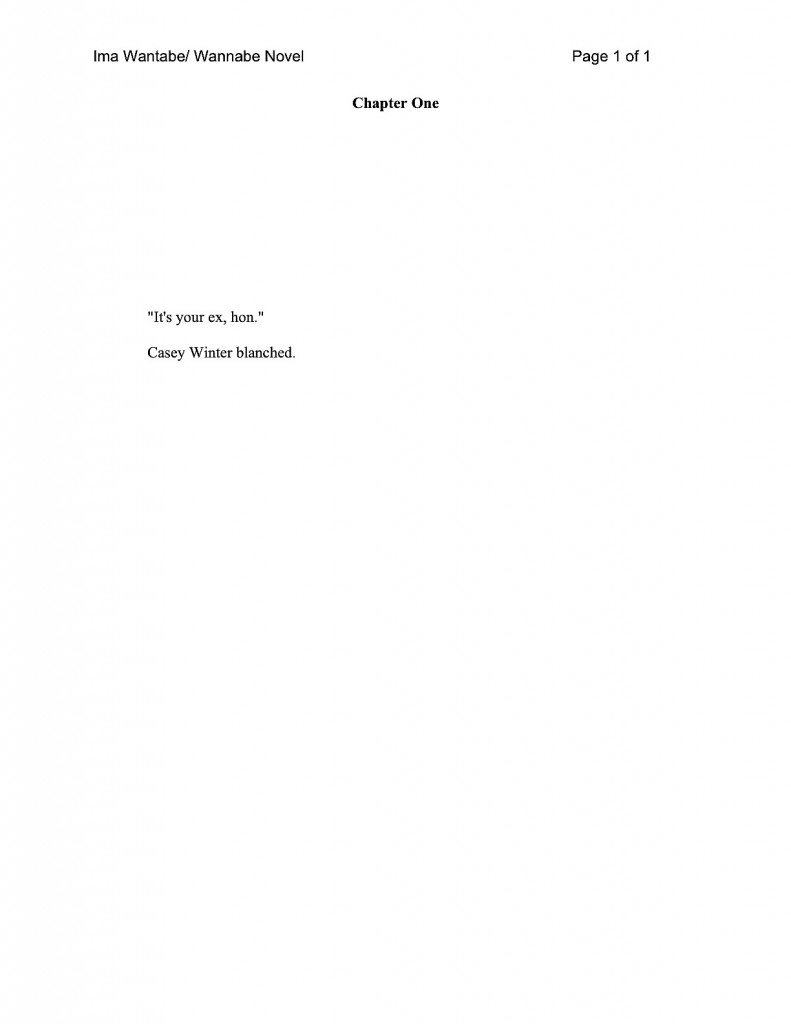
Three guesses: which particular species of word repetition am I going to tackle today?
Actually, that was a trick question — I’m going to be talking about two of the most common, gratuitous character name repetition and character naming that inadvertently gives the impression of same. Why talk about them together, you ask? Because in manuscript submissions, faux pas of a feather tend to flock together.
Why, yes, that was a mixed metaphor, now that you mention it. Would that the following not-all-that-uncommon type of fiction opening suffered from only metaphor-blending.
Morris strode into the opulent drawing room, so oddly out of keeping with the rest of the austere log cabin. “Mona, I’ve had enough,” Morris said. “It’s me or Maurice!”
Mona moaned. “Darling Morris,” Mona mentioned, “whatever do you mean? Marius means nothing to me, and Mencius hasn’t entered my thoughts for years. Now Merton, on the other hand…”
“Aha!” Morris gloated audibly. “Hoist with your own petard, Mona!”
“I haven’t used a petard in years, Morris,” Mona murmured, but he seemed not to hear her.
“I wasn’t talking about that twit Marius, Mona — I am accusing you of being in love with Maurice!” Morris muscled aside a dainty occasional table. “What have you to say to that, Mona?”
Mona looked blank. “Maurice who?”
Maddening to read, is it not? If you really want to drive yourself mad, try reading it out loud. Or simply step into Millicent the agency screener’s shoes and read a good third of the fiction openings on any given day.
Why are these phenomena so pervasive in submissions? Believe it or not (but I hope you select the former), as evident as the too-similar names would be to virtually any reader, most aspiring writers — nay, most writers, period — seem to have a hard time noticing how their name choices can distract the reader. Or so I surmise from how defensive writers often get when editors like me suggest, however gently, that perhaps their manuscripts might benefit from some name fine-tuning.
In fact, I would bet a wooden nickel of the variety that folks are always urging one not to take that a fairly hefty proportion of the otherwise excellently-humored writers reading this have already taken a bit of umbrage from the nation’s seemingly inexhaustible supply. “But character names are a creative choice!” writers everywhere protest, indignant. “And if I like a character’s name, why shouldn’t I use it a lot? It’s necessary for clarity, you know!”
Is it now? More to the point, is it always? I ask because usually, what indignant name-dropping writers have in mind as the only feasible alternative is something like this:
He strode into the opulent drawing room, so oddly out of keeping with the rest of the austere log cabin. “I’ve had enough,” he said. “It’s me or him!”
She moaned. “Darling, whatever do you mean? He means nothing to me, and that other guy hasn’t entered my thoughts for years. Now a third fellow, on the other hand…”
“Aha!” he gloated audibly. “Hoist with your own petard!”
“I haven’t used a petard in years,” she murmured, but he seemed not to hear her.
“I wasn’t talking about that twit — I am accusing you of being in love with You Know Who!” He muscled aside a dainty occasional table. “What have you to say to that?”
She looked blank. “Who?”
Yes, this pronoun-fest would be a bit difficult for your garden-variety reader to follow. As justifying examples go, however, you must admit that this one’s a bit of a straw man. I’m not saying that you should never mention your characters by name at all. No one — no one sensible, anyway — would seriously suggest that, because you’re right: naming characters can be awfully handy for identification purposes.
Nor is anyone here arguing that character names don’t fall firmly within the province of authorial discretion (but don’t be surprised if your future agent/editor/some random guy from your publisher’s marketing department harbors few thoughts on the subject). No, what we sensible editorial types have in mind was a revision more along these lines:
Morris strode into the opulent drawing room, so oddly out of keeping with the rest of the austere log cabin. “Elaine, I’ve had enough,” he said. “It’s me or Armand!”
She sat bold upright on a chaise clearly designed for supporting an inclination to recline. “You mean Armand Jean, the Duc du Plessis, otherwise known as Cardinal Richelieu? Why, he’s been dead for either decades or centuries, depending upon when this scene is set!”
Morris sank to the floor, clutching his head in his hands. “Oh, God, have I been time-traveling again?”
Just kidding — that was the edit the guy from marketing wanted. (Oh, come on — you wouldn’t keep reading?) Simply making the names less similar would produce a run of text a little more like this:
Morris strode into the opulent drawing room, so oddly out of keeping with the rest of the austere log cabin. “Elaine, I’ve had enough,” Morris said. “It’s me or Arnold!”
Elaine moaned. “Darling Morris,” Elaine mentioned, “whatever do you mean? Stefan means nothing to me, and Ned hasn’t entered my thoughts for years. Now Edmund, on the other hand…”
“Aha!” Morris gloated audibly. “Hoist with your own petard, Elaine!”
“I haven’t used a petard in years, Morris,” Elaine murmured, but he seemed not to hear her.
“I wasn’t talking about that twit Stefan, Elaine — I am accusing you of being in love with Arnold!” Morris muscled aside a dainty occasional table. “What have you to say to that, Elaine?”
Elaine looked blank. “Arnold who?”
Come on, admit it — that’s easier to follow, isn’t it? As little as writers might want to hear it, anyone who has ever screened manuscripts or judged contest submissions could tell you (quite possibly whilst clutching his aching head and/or bathing his weary eyes) that the best or only test of the strength of a character’s name is not whether the writer happens to like it.
Yes, yes, I see your hackles rising, defenders of authorial rights: the writer of this turgid little exchange may well have been deeply enamored of every name in the original draft. I can guarantee, though, that the reader will find this set of monikers considerably more individually memorable — and thus more conducive to matching with each character’s personality.
While you’re retracting those hackles, however, let me ask you: this time through, did you notice how often Morris and Elaine’s names appeared for no good reason?
If you’re like most writers, the answer is no. Seriously, folks, you’d be astonished at just how often a given character’s name will pop up within a single page of text in the average manuscript submission — and even more astonished at how difficult it is for chronic name-repeaters to spot the problem in their own writing. Like the bugbear of our last few posts, the ubiquitous and, major characters’ names seem to become practically invisible to self-editing writers.
But you know better, right? In a two-person scene, is it remotely necessary to keep reminding the reader who those two people are? Yes, it’s helpful to identify speakers the first time around, but couldn’t any reader familiar with the principle of alternating dialogue be relied upon to keep track of which is speaking when thereafter?
And while we’re at it, isn’t audibly a trifle redundant here? What else are the quotation marks for, if not to alert the reader to words having been uttered aloud? Could not the writer assume sufficient intelligence in the reader to render this rendition a viable option?
Morris strode into the opulent drawing room, so oddly out of keeping with the rest of the austere log cabin. “I’ve had enough. It’s me or Arnold!”
Elaine moaned. “Darling, whatever do you mean? Stefan means nothing to me, and Ned hasn’t entered my thoughts for years. Now Edmund, on the other hand…”
“Aha! Hoist with your own petard!”
“I haven’t used a petard in years,” she murmured, but he seemed not to hear her.
“I wasn’t talking about that twit Stefan — I am accusing you of being in love with Arnold!” He muscled aside a dainty occasional table. “What have you to say to that?”
She looked blank. “Arnold who?”
Oh, there go those writerly hackles again — it takes so little to raise them. Clarity and flow not enough for you?
“I guess that’s fine,” hackle-raisers mutter, kicking the nearest piece of heavy furniture, “but really didn’t see a problem with the earlier version. I miss the fun names.”
Of course you do — as a writer. As a reader, you almost certainly wouldn’t; let’s face it, the similarity of the names of Mona’s presumptive lovers could only be amusing for so long. It’s also a type of joke that our Millicent sees often enough in submissions that even if it did tickle her funny bone at first, it could hardly strike her as original. On the whole, she’s more likely to be pleased to see some naming restraint. She spends so much time trying to remember which character is which, you see.
Oh, you think that’s not difficult? Okay, try a little experiment: hie yourself to the nearest well-stocked bookstore and pull twenty books off the shelves. Stack them neatly before you and read the first page of each. Wait five minutes, then jot down as many of the main characters’ names as you can.
It’s not so easy. Especially if you happened to select books in which the characters boast similar names. Which prompts me to ask: everyone did catch the plethora of Js in today’s title, right?
I sincerely hope so: names beginning with J have for years been by far the most common in submission, especially in YA. Isn’t that right, Jeremy, Josh, and Jesse? And don’t even get me started on the many, many years during which John, Jon, Jonathan, Jack, and Johnny traipsed merrily through the pages of virtually any novel one might happen to pick up in an airport.
Just between us, Justin, a screener or contest judge doesn’t have to be on the job for very long to start longing for the odd Anthony, a wayward Terence, a charming Gregory, merely for the sake of variety. “Would it kill the average submitter,” Millicent moans into her third latté of the morning (hey, something’s got to keep her awake), “to give a passing thought to naming his protagonist Keith?”
Oh, Millie, I feel your pain — but at the risk of repeating myself (oh, John, must we go over this again?), it’s my considered opinion that on the manuscript page, writers just don’t spot the problem. Partially, that’s attributable to an unfortunate fact of submission: a good 90% of writers currently sending off manuscript pages to agencies, small publishers, and writing contests have never actually clapped eyes upon another writer’s manuscript.
So is it really any wonder that any given submitter should be unaware that by the time Millicent meets his protagonist, Joshua Jefferson, in the course of her screening day, she will have already had the pleasure of making the literary acquaintance of 13 other Joshes, Jeffs, and possibly their sons? As far as they know, her Josh is the only one in town.
Then, too, all of us are just used to knowing quite a few people with the same first name. So is Millicent. In her case, though, all the sympathy this experience sparks is to wonder why so few writers seem to have noticed that in the real world, it’s often kind of inconvenient when several people moving within the same circles share the same name.
Says the former coed who could walk into her collegiate dining hall, shout “David!” and see a third of her male classmates turn around. Someone in the admissions office — and in the nation’s maternity wards a couple of decades earlier — sure must have been awfully fond of it.
Before any of you slice-of-life aficionados leap to your feet to argue the virtues of having a manuscript’s naming strategy hold, as ’twere, the mirror up to nature, let me hasten to add that it’s really, really common for readers to confuse characters whose names begin with the same capital letter, let alone the same first syllable. It may be fun to plan a story about adventurous twins Ken and Kendra, but on the page, it’s likely to confuse a skimmer. So are those intrepid best friends, Dustin and Justine.
Oh, you don’t believe me, friends of Morris, Maurice, and Marius? Okay, let’s take a peek at some of these naming faux pas in their native environment, the manuscript page. If you’re having trouble reading such small type so fast, I recommend holding down the COMMAND key and pressing + to enlarge the image.
For those of you who would like to replicate Millicent’s experience within the comfort of home, I invite you to try to read your way all the way down the page in less than 30 seconds. On your marks, get set — squint!
How did you do? Award yourself a gold star if you spotted all 9 iterations of John in the body of the text — and another if you caught the author’s name in the header. (No, that wouldn’t count as repetition in the text, now that you mention it, but to a repetition-weary Millicent at the end of a long day, it might contribute subconsciously to her sense of being bombarded by Johns. She’s only human, you know.)
So far, so good. But let me ask you: did the 6 Paulines bug you at all? Or did they simply fade into the woodwork, because your brain automatically accepted them as necessary to the text?
Again, for most writers, the answer would be no — as long as this page had fluttered gracefully out of their own manuscripts. Admittedly, though, not all of them would have instantly leapt to their feet, crying, “My heavens, Mr. or Ms. Johns, have you never met a pronoun you’ve liked?”
That’s quite a bit more charitable than what a nit-picky reader would have shouted — and since that demographic includes practically everyone who has ever read for a living, including agents, editors, and contest judges, you might want to worry about that. Millicent, I assure you, would have found the level of name-repetition here eye-distracting.
How eye-distracting, you ask with fear and trembling? Well, let me put it kindly: how distracted from your fine writing would you find it acceptable for her to be? Wouldn’t you rather she focused upon the many excellencies of your style than all of those Js and Ps?
News flash: proper nouns are as susceptible to over-use in writing as any other kind of words. Although aspiring writers’ eyes often glide over character and place names during revision, thinking of them as special cases, to professional eyes, there is no such thing as a word exempt from being counted as repetitive if it pops up too often on the page.
In fact, proper noun repetition is actually more likely to annoy your friendly neighborhood Millicent than repetition of other nouns. (Did you catch how frequently fog appeared in that last example, by the way?) Too-frequent repetition of the character and place names makes the average editor rend her garments and the garden-variety agent moan.
If it’s any consolation, they’ve been rending and moaning for years; proper nouns have been asserting and re-asserting themselves on the manuscript page for a couple of decades now. Pros used to attribute this problem to itsy-bitsy computer screens.
Oh, did that reference perplex you, children? Ask your parents about the early Macs’ postcard-sized screens. They weren’t even tall enough to give a life-sized reflection of an adult face. If the user made the text large enough to read, the screen would only hold a dozen or so lines.
But as technology has progressed, the screens on even inexpensive computers have gotten rather large, haven’t they? Even on a tablet, you can usually view of half a page, at least. My extra-spiffy editor’s monitor can display two full-sized manuscript pages side by side. I could serve a Thanksgiving dinner for eight upon it, if I so chose.
I never have so chosen, in case you were curious. But it’s nice to have the option.
Given how much easier it is to see words on a screen now than in days of yore, Millicent is left at a loss to explain why writers so seldom have a clear idea of how distracting name repetition can be on a page. Could it possibly be as simple as writers tending to christen their major characters with their favorite names (I’m looking at you, John), ones they like so much that they simply cannot see the darn things crop up often enough?
Good guess, Millie, but I don’t think that’s all that’s going on. I suspect it has to do with how differently the eye reads text on a backlit screen: it definitely encourages skimming, if not great big leaps down the page. But for the most part, I believe it has to do with how infrequently writers read their own work in hard copy.
Hear that Gregorian-like chanting floating through the ether? That’s every writer for whom I’ve ever edited so much as a paragraph automatically murmuring, “Before submission, I must read my manuscript IN ITS ENTIRETY, IN HARD COPY, and OUT LOUD.” I repeat this advice so often that writers who read this blog religiously have been heard to mutter this inspiring little axiom unconsciously their sleep, under their breath during important meetings, on their deathbeds…
So my prescription for learning to head this Millicent-irritant off at the pass will not, I suspect, come as a complete surprise: the best way to catch any visual pattern on the printed page is, you guessed it, to print out the page in question and read it. As I think you will soon discover, proper nouns are unusually gifted at flagging down a reader’s attention.
Since I don’t see too many of you stampeding in the direction of your manuscripts to verify this in your own writing, here’s another example. Again, you’ll get the most out of this exercise if you read it at top speed.
Did you notice how your eye longed to leap from one T to the next, even if it meant skipping some text? That’s only natural. Come a little closer, and I let you in on a closely-held professional readers’ secret: the skimming eye is automatically attracted to capital letters.
That’s why, in case you had been wondering, not-especially-literate people tend to Capitalize Words for Emphasis. When they’re not placing words that no one has ever said aloud inside quotation marks, that is — another widespread professional readers’ pet peeve. It’s virtually always grammatically incorrect to Use Punctuation to Attract Unwarranted Eyeballing, just as it’s seldom literarily acceptable to “surround” words like “this,” presumably to demonstrate to the “reader” that were these words being “spoken aloud,” someone might emphasize them, but that doesn’t seem to stop devotees of either practice.
To be fair, using punctuation as a substitute for writing that calls attention to itself does indeed work. Just be aware that among print-oriented people, that attention will probably not be positive.
Proper nouns, on the other hand, claim capitalization as a natural right. Completely legitimately, they jump off the page at the reader — which can be a good thing, if a manuscript is crammed to the gills with action, unnamed characters, and other literary titivations that do not involve the named characters. That way, reader’s eye will be drawn to the major players when they show up. Problem solved, right?
In most manuscripts, no. It’s pretty common for narratives to remind readers unnecessarily often of even the protagonist’s name. And since most novels and pretty much all memoirs deal with their respective protagonists on virtually every page, that can result in a whole lot of capital letters competing for Millicent’s attention.
Are you satisfied with that outcome, John? John? If you don’t start paying attention, I’ll have to page Pauline.
Millicent’s constantly confronted by scenes constructed by authors evidently terrified that some reader will forget who is speaking. Or so she must conclude by the frequency with which characters address one another by name — much more often than would be bearable in real life. And it’s not just the characters that seem to fall prey to this fear: narratives often compulsively name and rename everyone in sight. Heck, while we’re at it, why not remind the reader of how those characters are interrelated?
“But that’s not fair, Mom!” Cecile wailed.
Her mother stroked her bent head. “Now, Cece, you knew running for Congress was going to be hard.”
The daughter batted the maternal hand away. “It’s no use, Mom. I simply cannot kill another baby. My pucker is broken.”
Call me zany, but I cling to the hope that when one character refers to another as Mom, a conscientious reader will be able to figure out that the latter is the former’s mother. Similarly, once that reader has been made aware that the latter gave birth to the former, I’m pretty confident that the conclusion that Cecile is the daughter will not be an especially surprising revelation.
Besides, we’re not dealing with legions of characters here. Unless the one of the characters happens to have multiple personalities, most readers will leap to the radical conclusion that the names of the conversants will not alter substantially within the course of a few pages of dialogue. So why keep labeling the participants in a scene where there’s little probability of confusing the reader?
A fine question — and the reason professional editors so frequently cut tag lines (he said, she said), rather than having the narrative identify every speaker every time s/he opens his or her pretty mouth. Once the narrative has established the speakers in two-person dialogue (far and away the most common variety, by the way), a reasonably intelligent reader is more than capable of remembering what both of those people are called by their kith and kin.
So if your text seems to have broken out in capital letters, look first at the dialogue, both inside the quotation marks and without. In dialogue where the use of tag lines has not been minimized, proper names can pop up so frequently that it’s like a drumbeat in the reader’s ear.
And it’s my job to get you to hear it as you read. I can keep producing these examples all day, people.
“I don’t think that’s fair of you, April,” Louisa snapped.
“Why not?” April asked.
“Oh, don’t be disingenuous with me, April. I’ve known you too long.”
April played with a nearby paperweight. Was she testing its weight for throwing? “Honestly, Lou, I haven’t the slightest idea what you’re talking about. Unless this is about John?”
“Of course it’s about John,” Louisa huffed. “How many husbands do you think I have?”
“Just one,” April said, smiling. “It’s been just John since the seventh grade.”
Louisa’s eyes stung for a moment. April always had known how to push her buttons. “Don’t change the subject, April. Next, you’ll be reminiscing about that time we tarred and feathered our classmate when we were in the fourth grade.”
April sighed. “Those were the days, eh, Lou?”
“I’ll say,” Louisa said, edging out of paperweight-tossing range. “She should have known better than to beat you at tetherball.”
Yes, speakers in the real world do call one another by name this much sometimes, but like so much of real-life dialogue, that level of repetition would be snore-inducing, if not downright hypnotic, on the page. Especially when name-bearing tag lines are featured in the text, even dialogue between just a couple of characters can convey the sense of a very crowded room.
Does that combination of frantic jumping and wild arm-waving mean that some of you would like to add something here? “But Anne,” some perennial reader-distrusters point out, “wasn’t that last example rather unwise? I mean, if you took your vicious red pen to that exchange, slashing all of the proper nouns but the first set required to set up the alternating dialogue rhythm, you’d end up in precisely the dilemma we saw at the top of this post, the one you dismissed as a straw man: a scene in which the characters share a pronoun. Get out of that one, smarty-pants!”
In the first place, I seldom edit with red pens: due to early school training, virtually any adult will perceive red-inked marginalia as more critical than commentary scrawled in another color. (And you might be shocked at how excited some adult writers become when they learn that if a paragraph is especially good, I have been known to slap a gold star next to it. Book-length revisions have been fueled by the hope of gold stars.) And in the second place, with a little finesse, depicting an exchange between pronoun-sharers need not be at all confusing.
We’re writers, after all: why should the only possible word choice to replace a proper noun be a pronoun? Use your creativity, as well as your scissors. And don’t be afraid to rearrange a little text.
“I don’t think that’s fair of you, April,” Louisa snapped.
“Why not?”
“Oh, don’t be disingenuous with me. I’ve known you too long.”
April played with a nearby paperweight. Was she testing its weight for throwing? “Honestly, I haven’t the slightest idea what you’re talking about. Unless this is about John?”
“Of course it is. How many husbands do you think I have?”
“Just one. It’s been just John since the seventh grade.”
Louisa’s eyes stung for a moment. April always had known how to push her buttons. “Don’t change the subject. Next, you’ll be reminiscing about that time we tarred and feathered our classmate when we were in the fourth grade.”
“Those were the days, eh, Lou?”
She edged out of paperweight-tossing range. “She should have known better than to beat you at tetherball.”
We weren’t exactly flung headlong into a morass of confusion there, were we?
“But Anne,” pronoun-eschewers protest, and who could blame them? “You keep giving us dialogue examples. I find myself going out of my way to eschew pronouns in narrative paragraphs as well. Is there then no hope of quelling my deep and abiding fear of being misunderstood when I’m describing a couple of similarly-gendered characters?”
Never fear — we already have a very capable quelling device in our tool kit. And look, here’s a dandy excerpt to which we can apply it, fresh from the pen of someone terrified that two shes in a scene is one lady too many.
Eve slapped her laptop shut with a bang and glanced around, annoyed, for her waitress. Naturally, Tanya was nowhere in sight. Eve ostentatiously drained her drink to its dregs, but when Tanya did not come running, Eve filched a straw from the table next to her. The guy tapping away on his laptop never even noticed. Eve made slurping sounds on the bottom of her glass with it.
Still no sign of Tanya. For good measure, Eve upended the glass, scattering swiftly melting ice cubes messily all over the starched white tablecloth, and began banging the now-empty vessel upon the now-sodden linen.
Silently, Tanya retrieved Eve’s glass from Eve’s waving hand. Tanya inclined her head toward the wall clock: ten minutes past closing time.
Eve looked up at Tanya with that my-daddy-is-someone-important air that always worked with bank tellers, hot dog vendors, and waitresses who lived primarily upon their tips. Haughtily, Eve tapped her fountain pen on each of the seven empty Perrier bottles before her. How dare Tanya treat her like a drunk?
At this juncture, dare I hope that you found this at least a bit annoying to read? Come on, admit it — if I had opened the post with this example, it would have struck you as better prose, right? Which is why, I can reveal at long last, I’ve been positively burying you in examples today: until you’ve had to read page after page of name-heavy prose, it can seems a trifle counter-intuitive that reusing a single word — any single word — within two consecutive lines might be irritating to a reader.
Yes, even if the word in question is not a proper noun. The capitalization of a name merely makes it stand out more, bellowing at Millicent, “Look at me! Repetition here! Wouldn’t want to miss it, would you?”
So what, the fearful ask, are we to do about it? Clearly, we can’t just replace all of the proper nouns with she; the narrative might conceivably become confusing. (If you retain any linger doubts about how confusing a narrative can be when no proper names are used at all, get a 4-year-old to tell you the plot of a movie he’s just seen.) And clearly, going after tag lines and characters naming one another wouldn’t be helpful in a scene containing neither.
That doesn’t mean, however, that we can’t perform a little judicious proper noun removal surgery. We’ll just have to exercise a little more creativity. Here’s the same scene again, streamlined to minimize the perceived necessity of naming the players.
She slapped her laptop shut with a bang and glanced around, annoyed, for her waitress. Naturally, Tanya was nowhere in sight. Eve ostentatiously drained her drink to its dregs, but when no one came running, she filched a straw from the table next to her — the guy tapping away on his computer never even noticed — and made slurping sounds on the bottom of her glass with it.
Still no sign of life. For good measure, she upended the glass, scattering swiftly melting ice cubes messily all over the starched white tablecloth, and began banging the now-empty vessel upon the now-sodden linen.
Silently, Tanya snatched the glass in mid-flight. She inclined her head toward the wall clock: ten minutes past closing time.
Eve looked up at her with that my-daddy-is-someone-important air that always worked with bank tellers, hot dog vendors, and waitresses. God, she hated being treated like a drunk. Haughtily, she tapped her fountain pen on each of the seven empty Perrier bottles before her
Anybody especially confused? I thought not.
Before any of you proper noun-huggers out there start grumbling about the care required to tell when a pronoun is appropriate and when a proper noun, let me hasten to point out that this was not a very time-consuming revision. All it required to alert the reader to which she was which was a clear narrative line, a well-presented situation — and a willingness to name names when necessary.
That, and an awareness that repeating names even as far apart as three or four lines just doesn’t look good on a printed page; it can draw the eye away from an orderly, line-by-line reading, and therefore detrimental to the reading experience. A proper noun repeated more than once per sentence, or within a single line of text, almost always seems just a trifle odd to a reader — and more than a little annoying to Millicent.
Feel as though you will be excising proper nouns in your sleep? Excellent; my work here is done. Night-night, John-John, and keep up the good work!

